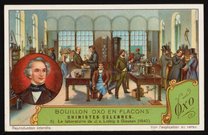Trade card for Cubes de Bouillon Oxo with August Wilhelm von Hofmann
- 1929

Rights
Download all 2 images
PDFZIPof full-sized JPGsDownload selected image
Small JPG1200 x 779px — 260 KBLarge JPG2880 x 1870px — 1.2 MBFull-sized JPG2890 x 1876px — 1.2 MBOriginal fileTIFF — 2890 x 1876px — 15.6 MBIllustrated trade card depicts German chemist August Wilhelm von Hofmann (1818-1892) at the inauguration of the School of Chemistry in London in 1846, of which Hofmann served as the first director. Men stand at a table with scientific instruments. The trade card also features an inset bust of Hofmann. Verso includes an advertisement for Liebig's Oxo bouillon cubes, as well as a biography of Hofmann.
August Wilhelm von Hofmann (1818-1892) was born on April 8, 1818. He studied under Justus von Liebig, and was himself the teacher of Fritz Haber and William Henry Perkin. He was an organic chemist who specialized in aniline and naptha. The Hofmann rearrangement, the Hofmann elimination, and the Hofmann–Löffler reaction were all the results of his research. He died on May 5, 1892.
Liebig's Extract of Meat Company was founded in 1865 by Justus von Liebig and George Christian Giebert. While the product was produced exclusively in Uruguay, it was extremely popular in Europe, with 500 tons of the product produced every year in the late 1870's. The company was very successful and eventually was bought by the Vestey Group in 1924. In 1968 the company merged with Brooke Bond and was eventually bought by Unilever in 1984. It was subsequently sold to Premier Foods in 2006.
| Property | Value |
|---|---|
| Publisher | |
| Format | |
| Genre | |
| Medium | |
| Extent |
|
| Language | |
| Subject | |
| Rights | In Copyright |
| Rights holder |
|
| Credit line |
|
Institutional location
| Department |
|---|
Related Items
Cite as
“Trade Card for Cubes De Bouillon Oxo with August Wilhelm Von Hofmann.” Lithographic ink. Liebig's Extract of Meat Company, 1929. Science History Institute. Philadelphia. https://digital.sciencehistory.org/works/gx41mk00h.
This citation is automatically generated and may contain errors.
Rights
Download all 2 images
Searchable PDFmay contain errorsZIPof full-sized JPGsDownload selected image
-
Keyboard Shortcuts
Previous image shift + or , Next image shift + or . Pan image Zoom in + or shift + Zoom out - or shift + Zoom to fit 0 Close viewer esc Also
Mouse click to zoom in; shift-click to zoom out. Drag to pan. Pinch to zoom on touch.






